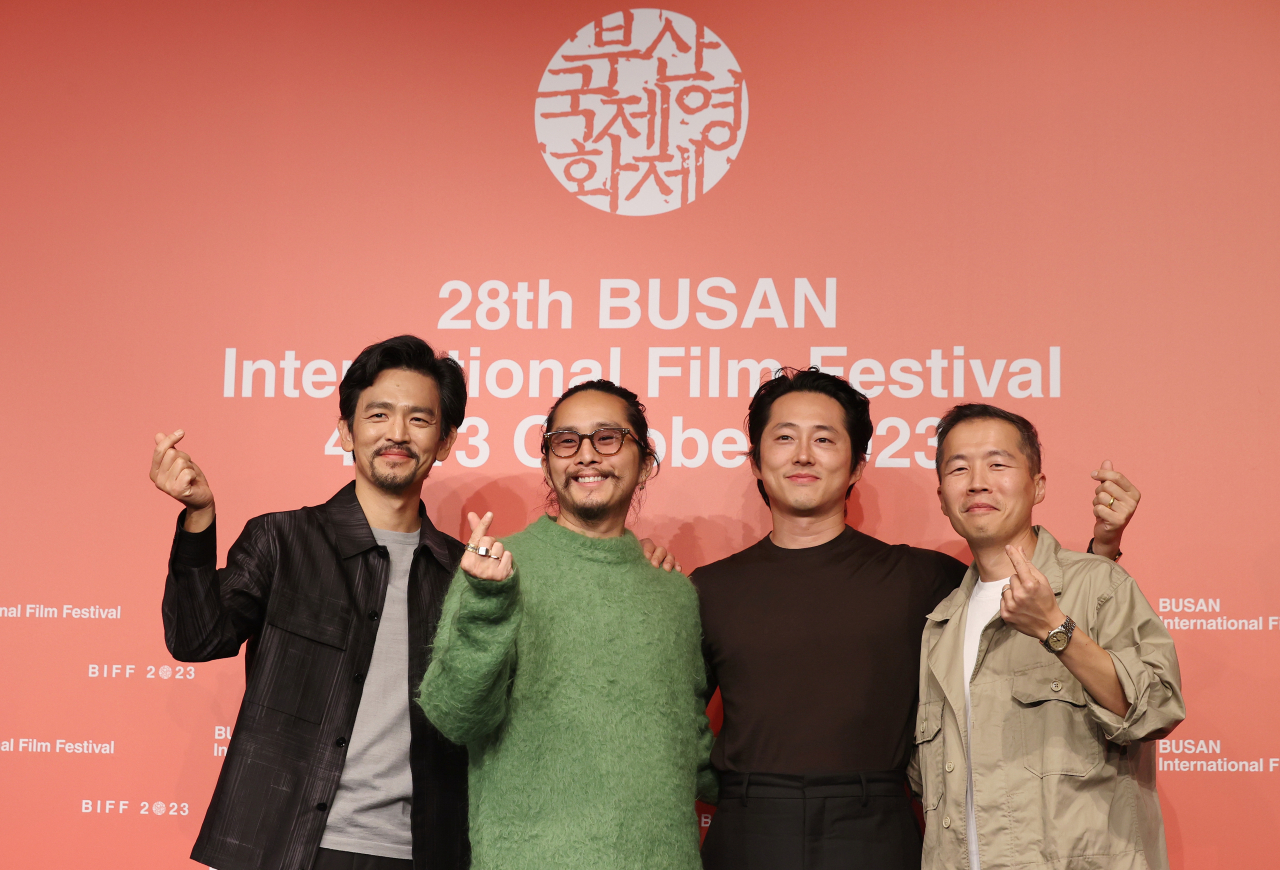Korean American actors, directors say 'Koreanness’ made them think more deeply about cinema
BIFF’s first-ever 'Korean Diasporic Cinema' section brings together Korean American filmmakers, actors to discuss unique storytelling in immigrant experiences
By Kim Da-solPublished : Oct. 6, 2023 - 18:16

BUSAN -- Korean American actors and filmmakers including John Cho, Steven Yeun, Justin Chon and Lee Isaac Chung gathered Friday in the port city of Busan, South Korea, as part of the Busan International Film Festival’s newly established section, “Korea Diasporic Cinema,” which showcases critically acclaimed works by or featuring Korean Americans.
The programmer of Asia’s largest film festival said that the festival organizers wanted to delve deeply into Korean Americans’ creative processes and provide an opportunity to evaluate their position within the US film industry as Hollywood has begun to take notice of these filmmakers and actors.
“Originally planned two years ago, the meeting of four renowned Asian Americans became finally possible this year, because they now have the time to come to Korea due to the strike in Hollywood,” said BIFF programmer Park Do-shin, jokingly. The strikes by the Writers Guild of America and Screen Actors Guild – American Federation of Television and Radio Artists, over labor disputes with the Alliance of Motion Picture and Television Producers, brought things to a complete halt in Hollywood this year.
From “Minari” to “Jamojaya” and “Searching,” the unprecedented attention and focus on Korean American immigration stories and the unique ways Korean Americans tell stories that have resonated with audiences globally, being Korean American right now is just an “uplifting feeling,” according to the Korean American actors and directors participating in the session.
“The fact that four of us can sit at our table here in the same location and at the same time is really great. It’s uplifting for me, as a Korean American, paving the way in Hollywood," said director and actor Chon. He went on to explain that watching Americans consume Korean cinema and entertainment, he feels that his "white counterparts finally have something to relate to me." Korean content also offers a glimpse into other cultures and raises viewer interest in them, Chon observed.
“I've come to Busan for the first time in 15 years and I saw old gentlemen in the audience yesterday who were open and willing to ask more vulnerable questions. That was uplifting -- and something that I didn’t experience in 2008. Communication (from the audience here) has become more transparent and honest,” he added.
The four said their Korean backgrounds have made them really think deeply about cinema and pursuing an artist's career.
“When I was young, we were told to not make movies. We had to choose different paths. That has encouraged me to have courage and boldness with Korean spirit,” said director Chung who won a Golden Globe Award for Best Foreign Language Film in 2021.
Echoing his view, Chon said he came to “think about Koreanness more deeply and it gets manifested through the heart.”
Asked what makes the world interested in Korean American immigrants’ stories, the actors said it has to do with their unique storytelling.
“I do feel like it (the Korean American immigrant story) is an interesting and dramatic situation, an underdog story, a life of transition. Immigrant stories also make a dramatic setup,” said John Cho.
"When you look at these films (about Korean American immigrants), we can see how they are symbolic of how any society works. Moving forward (as immigrants do) and starting from the ground up is an important mentality," said Steven Yeun.
Besides that, the four saw the appeal of Koreans' senses of humor.
“I see the differences in the sense of humor and the acting – Koreans might be subtle in (certain) scenes whereas Americans might show more obvious expressions. When I watch Korean films, it feels like you are watching their lives,” said Chung.
Chon, whose film "Jamojaya" is about an Indonesian rapper about to debut in the US, added that there are a lot of “crossovers” now.
“As I grew up and looked at other immigrants and minorities telling stories, I noticed that I really wasn’t alone the entire time. So now when I tell my own stories, (I see) people find common ground with one another,” said director Chon.
“But from a structural point of view, Hollywood films value plot heavily, whereas Asian and Korean films really prioritize the emotional and philosophical elements over the plot sometimes,” Chon said, also praising Steven Yeun’s recent Netflix series “Beef,” which garnered popularity globally for “bridging the gap” among what matters to various audiences.



















![[Today’s K-pop] Treasure to publish magazine for debut anniversary](http://res.heraldm.com/phpwas/restmb_idxmake.php?idx=642&simg=/content/image/2024/07/26/20240726050551_0.jpg&u=)